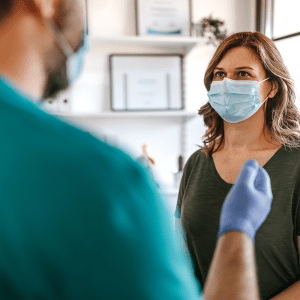November 9, 2021

Written by Michelle Martin for St. Joseph Hospital
Dr. James Martin worked in emergency medicine for 25 years before moving to urgent care. Now Medical Director at St. Joseph Hospital Urgent Care in Milford, NH, he often sees patients who aren’t sure when they should visit an urgent care or make a trip to the emergency department.
He also is seeing more patients who are going to urgent care instead of the ED because they believe their condition can be checked out quickly.
“I’ve been on both sides (emergency medicine and urgent care) and this is becoming more common,” he said. “Patients might come into urgent care saying, ‘I can’t move my right arm,’ but they don’t think it could be a stroke. Or they’ll say they don’t want to go to the emergency department because they are worried about COVID.”
But that’s a potentially dangerous situation, he said. Urgent cares aren’t designed to handle life-threatening issues, such as strokes and heart attacks.
“Ultimately, patients are delaying their care while we transfer them to the emergency department,” he said.
The confusion between the two entities — emergency departments and urgent cares — has become so common that Martin, along with Dr. Deepak Vatti, Chief of Emergency Medicine at St. Joseph Hospital, recently held a Facebook Live event about it.
“An emergency department is built to see and stabilize any medical issue,” Vatti said. “An urgent care can have varying capability as some can have advanced imaging and lab work, but they cannot handle more serious medical issues.”
People who visit an urgent care with an issue that is too significant to be handled there will be advised to go to an emergency department; in some cases, the urgent care will have patients transferred via ambulance.
Tips for choosing the ED or urgent care

But with emergency departments and urgent cares both handling conditions that need to be seen right away, how do patients know which is right for them?
“The way to look at an emergency environment is that you should go there if you are having serious, life-threatening conditions — a heart attack, stroke, profusely bleeding, major trauma from an accident or severe abdominal pain that could indicate appendicitis or a gall bladder attack,” Martin said.
People who have complex medical problems should also visit the emergency department if their symptom or concern may be related to an existing medical condition. Problems that seem minor are a reasonable option for urgent care, Vatti said.

“If you feel the condition probably is not likely permanent or life-threatening, an urgent care is a good option,” Vatti said. “But it can be difficult to distinguish serious or life-threatening issues, and if you’re not sure, an emergency department is able to assess and stabilize anything.”
Some issues that are best suited for an urgent care include: strep throat, ear infections, ankle or wrist sprains, small lacerations, coughs or rashes. “But if you are not sure, an ED is always the safe option,” Vatti said.
When in doubt, pick up the phone

Likewise, when deciding to visit the emergency department, you should also ask yourself how you will get there. “There is no issue too minor for 911 if you are unsure,” Vatti said. “If you feel the issue is stable and you are fully capable of driving without any limitations, you can consider driving. It is advisable to have a friend or family member drive you as opposed to you driving yourself.”
And if you are unsure if you should visit the urgent care instead of the ED, call and ask.
“Call first,” Martin said. “You can always call urgent care and ask whether it be appropriate for you to go to the urgent care or the emergency department.”